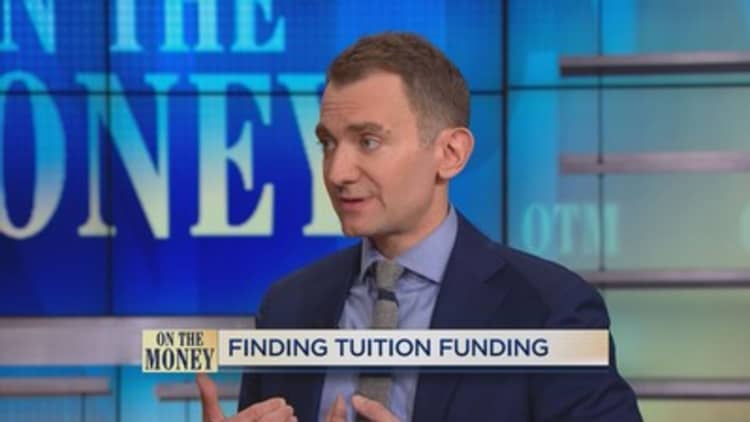As students commit to a college this spring, they face yet another hurdle: Finding the money for four years of tuition payments.
With the cost of college and student loan balances climbing, some parents and their children will clamor for any and all help available.
Yet both prospective and current students should heed this warning: That scholarship or seminar could actually be a scam.
"If something sounds too good to be true, it probably is," said Gregory Ashe, senior staff attorney at the Federal Trade Commission's Bureau of Consumer Protection. "It sounds corny, but it's true."
Questionable scholarship applications
One of the big clues that a scholarship could be swindling students for money is whether you are asked to pay an application fee.
About 41 percent of college students said they were asked to pay up when applying for a scholarship, according to a recent survey of 1,000 college students by The Student Loan Report. Of those who were asked to hand over money, 73 percent did.
"Never pay any kind of fee, no matter how reasonable it seems, when applying for a scholarship," said Mark Kantrowitz, a student loan expert and publisher at the website Private Student Loans Guru.
While the College Scholarship Fraud Prevention Act of 2000 helped to reduce these scams by creating stricter penalties, they do still pop up.
An application fee as small as $3 may not sound like much. But if there are more than 100,000 applicants and the scholarship is only around $180,000, for example, the profits from those fees will exceed the actual scholarship, Kantrowitz said.
And the chances you will actually be awarded the money could be small.
Remember, too, that these organizations do not need your Social Security number, according to Kantrowitz.
Also, watch out for scholarships that require work as part of the application. Kantrowitz cited one application that required law students to come up with solutions to a hypothetical legal scenario. It turns out the case was actually real for the party that was offering the scholarship.
Because there are a number of free scholarship search websites available, you shouldn't have to pay to search for these opportunities, Ashe said.

Suspicious college aid seminars
Seminars that offer financial aid advice are also ripe for potential scams.
These information sessions often offer help with the Free Application for Federal Student Aid, or FAFSA, a form that includes your financial information and helps colleges decide how much, if any, aid you will receive.
While there are legitimate outfits that help parents and students find financial aid, there are warning signs to be on the lookout for, according to Ashe.
"The biggest thing to look out for is if you're getting a high-pressure sales pitch that may be an indicator the program might not be on the up and up," Ashe said.
College is expensive enough. The last thing consumers should be doing is paying a couple of thousand dollars to a company that may or may not be legitimate. That money is better spent on tuition payments.Gregory Ashesenior staff attorney at the Federal Trade Commission's Bureau of Consumer Protection
A letter may come in the mail and look like an exclusive invitation to a seminar. In reality, that same invitation may have been sent to every prospective college student in the surrounding ZIP codes, Ashe said.
Seminars may offer to help you fill out the form in a way that will reduce the amount you will owe, particularly when it comes to the expected family contribution.
Watch out for sessions that offer to shelter your assets so that you will qualify for more aid through financial products like whole life or cash value life insurance.
Also be sure the information the seminar provides is transparent, Ashe said. If all of your questions aren't answered, that should be a red flag.
Also be cautious if the seminars claim to have better information than your high school guidance counselors or college financial aid professionals, Ashe said. Those individuals are your best resources, he said, and can often weigh in on whether an aid program is reputable.
More from College Game Plan:
How to decipher that college financial aid offer
Prepare for a tax surprise if you use your 529 college savings plan for this
5 graduate degrees that leave people drowning in debt
You should also be able to reach out directly to other consumers who have used the services in the past.
"Don't rely on the success stories provided in the seminar," Ashe said. "They could be fictional people or they could be paid shills."
As with scholarship applications, you should limit the information you give out. Do not share Social Security or credit card numbers.
You should also know exactly how much the services offered will cost, and if there is a refund policy if you don't get what you want out of the seminar.
"College is expensive enough," Ashe said. "The last thing consumers should be doing is paying a couple of thousand dollars to a company that may or may not be legitimate. That money is better spent on tuition payments."
WATCH: MCD's tripling college tuition benefit for employees





